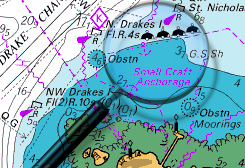You are viewing the expanded version of this Marina,
for faster browsing
use the regular version here
Portland Harbour
Courtesy Flag
Flag, Red EnsignWaypoint
Safe Offing 50:36'N 002:25'W (For North Channel)Charts
Admiralty 2255, 2268, SC5601Rules & Regulations
6 knts in many areas, 10 knts in others, Do not approach commercial area. See MapHazards
Some Commercial ShippingTidal Data Times & Range
HW Dover-0430 MHWS 2.1m MHWN 1.4m MLWN 0.7m MLWS 0.2m (links)This site is designed for slower, roaming broadband connections, like you would get at sea, so it needs JavaScript enabled to expand the text.
General Description
An absolutely massive harbour built for the Royal Navy, and now......
..... turned over to commercial and leisure use. It's very size, being suitable for fleets of warships, made it unsuitable for leisure craft, it's not far short of being 2 miles wide by 2 miles long. But now things have changed.
Anchorage can be had inside fairly snuggly providing the wind is in the westerly quadrant. Its usefulness as a stopping place to wait out foul wind or tide is limited by the proximity of the Portland Race and the Shambles Bank. If berthed within one would have to make a substantial detour in the wrong direction to clear the above-mentioned dangers while heading West, and if coming from the West (intending to head East) again standing off and backtracking would be involved.
Portland, like Weymouth has unusual tides... a small range combined with a stand of approx. 2 Hrs at LW.
Shipping and ferries use the docks in the southern corner, and pleasure craft are obliged to use the North Ship Channel only.
Up until recently there have been virtually no facilities within, but all this is now changing.... A huge new marina, capable of handling superyachts has recently opened, and with the build up to the Olympics (sailing events based here), you can be sure of more changes to come.
Four years on from the 2012 Olympics (is it that long ago) and the facilities provided for that event have left us with a superbly equipped marina, together with a sailing school and numerous outlets for yachtie type goodies!
Approach
For yachtsmen and motorboaters approach from the West involves rounding the.....
..... Portland Race and the Shambles at a safe distance before heading NNW, and making for the North Ship Channel.
There is an inshore passage between the Bill and the Race and for advice on how, when and whether to negotiate it can be found on the Weymouth and Portland Cruising Associations website at
Portland Race & Rounding the Bill via the inshore passage (wpca.org.uk)
We recommend that if you are at all unsure it's best to go round the long way.
From the East a good three-mile offing from St Alban's Head will keep you out of potential overfalls, after which you can make for Portland.
Be aware of the Lulworth Firing Range which stretches out to about six miles South of Lulworth Cove. If you heed our advice to stand off from St Albans Head and clear of the St Albans Ledge you will also remain just clear of the danger area. The Range Safety Boat is on channel 8 and you can get information from them or by phone on tel 01929 404712. There is a leaflet issued annually giving scheduled firing times and a digital copy can be found at
https://www.gov.uk/government/publications/lulworth-firing-notice
Approach and enter via the North Ship Channel and make for the anchorage or marina. A channel for small craft has been established leading from the North entrance to the marina and watersports centre, it's shown clearly on the chart provided and marked with lit buoyage. For a night entry, C Head is lit Oc.G.10s.15m.5M and B Head Oc.R.15s.11m.5M. Bear in mind speed limits and areas set aside for PWC's, which are shown on the harbour authority leisure page at:
http://www.portland-port.co.uk/leisure-activities
The East Ship Channel is reserved for commercial craft but if you call the Harbour on #74 and there is no commercial activity they would probably allow you to enter via this channel.
The South Ship Channel is closed by virtue of the old pre-WW1 HMS Hood being scuttled across the entrance.
Berthing, Mooring & Anchoring
The impressive Portland Marina is now open, you can't miss it, and we've got the latest chart.
Visitors rates (2022) are £3.75 per metre per day (summer rate), and include a free shore power hook up. Note that there are deals to be made if you use any other of their marinas (Cowes, Haslar and Weymouth) This could also be a very useful port of call, especially for super yachts and large vessels that can't be coped with in many places, as it can handle vessels up to 70m. Phone them on 01305 866190, link to the website below:
www.portlandmarina.co.uk
See our facilities section for what's available here.
The other option is to anchor.....this is still permitted, but you need to call up the harbour authority first. They will advise, and harbour dues will be payable. The harbour authorities are on VHF channel 74, callsign " Portland Harbour Radio", telephone 01305 824044, link to website below:
http://www.portland-port.co.uk
In general, anchorage is somewhere to the north-east of the New Channel to suit draft, within the 6knts speed limit area. This area is off the W and NW shore of the harbour. Keep an eye out for local moorings and it's a good plan to buoy the anchor.
Keep well clear of the piers and jetties in the Castletown area, navigation is forbidden here.
Updated May 2022
Facilities
Facilities available at Portland Marina include:560 annual berths for boats up to 44m, Dedicated visitors' berths for vessels up to 70m LOA. All berths fully serviced with water, electricity (included with the mooring fees for visiting boats),Wi-Fi, phone connection and satellite TV. 24hr manned security with CCTV, Excellent wash-rooms, changing and laundry facilities. On-site bar and restaurant.
For the boat, the facilities are pretty comprehensive too: Fuel berth offering petrol, diesel and bio-diesel, sewage pump-out facilities, 50T and 320T travel hoists, dry berthing for vessels up to 50 tonnes and undercover dry stack storage for power vessels up to 10m.
New 2018 They are opening a new dry stack storage building in early May 2018 - which is, apparently, huge.
Marine retail terrace including new boat sales, yacht charter, training school, yacht brokerage, marine electrical services and chandlery, plus commercial units including marine engineers, boat repair and rigging companies.
Helicopter landing facility ..... Hmmm.... pretty impressive eh ! Check out our directory to find out which businesses are locating here.
There are a various slipways for launching and recovering trailer boats, all being owned by the Weymouth and Portland sailing Academy. They are on 01305 866000 and it is worth phoning in advance as they host many regattas and sailing competitions. Day membership is available and allows use of the slips, plus the Academy facilities. Link to the website below:
Castletown Beach slip is very popular with divers and is available at three quarters of the tidal range. Limited provisioning is possible in the village, and there is a Chandlers and a dive shop, for more info use the link below:
http://www.geoffkirby.co.uk/Portland/685740/
PWC's have a special area set aside to use within the harbour, and the only slipway they are allowed to use is at Ferrybridge.
The following link provides comprehensive information for windsurfers:
https://www.bristolnomads.org.uk/location_reports/s_coast/portland.php
And finally for provisioning there is a large TESCOs on top of the island with a regular bus service (from memory it's quite a hike up there and fairly steep so it's worth swallowing your pride and hopping on the bus!)
History
Portland Harbour is located beside the Isle of Portland, off Dorset, on the south coast of England. It is one of the largest man-made harbours in the world.
The original harbour was formed by the protection offered by the south coast of England, Chesil Beach and the Isle of Portland. This gave protection from the weather to ships from all directions except the east. King Henry VIII built Portland Castle and Sandsfoot Castle to defend this anchorage.
Construction of the modern harbour began in 1849 when the Royal Navy created a breakwater to the south of the anchorage, made of blocks from local quarries on the Isle of Portland. This was completed in 1872 and created a much larger harbour providing protection from south-easterly winds. The Verne Citadel fort, Nothe Fort, East Wear Battery, High Angle Battery and two forts on the breakwaters were also built.
In 1906, with the threat of torpedo attack from the eastern side of the anchorage, two more breakwaters were added. A further barrier against submarine attack from the south came in 1914 when HMS Hood was scuttled across the southern entrance to the 1848 breakwater.
The western side of the Harbour with Chesil Beach, Lyme Bay and the Fleet Lagoon in the backgroundThe harbour is a popular location for wind surfing, diving and sailing, as Weymouth and Portland National Sailing Academy which will host sailing events in the 2012 Olympic Games, is located on the south-western shore of the harbour.
Only the second Victoria Cross ever awarded for action in the United Kingdom was posthumously bestowed on Jack Foreman Mantle who died at his post on HMS Foylebank during a 1940 air raid on Portland Harbour. Mantle's grave can be found in the Portland Naval Cemetery.
History
Portland Castle was built to defend Portland in the 16th century.Portland has been inhabited since at least the Mesolithic period (the Middle Stone Age)—there is archaeological evidence of Mesolithic inhabitants near Portland Bill, and of inhabitation in ages since. The Romans occupied Portland, reputedly calling it Vindelis. In 1539 King Henry VIII ordered the construction of Portland Castle to defend from attacks by the French; the castle cost the king £4,964. It is one of the best preserved castles from this period, and is open to the public under the administration of English Heritage.
Coastal flooding has affected Portland's residents and transport for centuries—the only way off the tied island lies below sea level on the lee of Chesil Beach, as does the village of Chiswell. In autumn and winter Chesil Beach faces severe storms and massive waves, which have a fetch across the Atlantic Ocean. Following two severe flood events in the 1970s, Weymouth and Portland Borough Council and Wessex Water decided to investigate the structure of the beach, and possible coastal management schemes that could be built to protect Chiswell and the beach road. In the 1980s it was agreed that a scheme to protect against a one-in-five year storm would be practicable; it would reduce flood depth and duration in more severe storms. Hard engineering techniques were employed in the scheme, including a gabion beach crest running 1.6 kilometres (1 mi) to the north of Chiswell, an extended sea wall in Chesil Cove, and a culvert running from inside the beach, underneath the beach road and into Portland Harbour, to divert flood water away from low lying areas.
Portland Harbour
Portland harbour is one of the deepest man-made harbours in the world at 12 metres (39 ft) to 20 metres (66 ft),[13] and one of the largest at 8.6 square kilometres (2,125 acres). The first stone of the Breakwaters was laid by Prince Albert in 1849, and the last by Albert Edward, Prince of Wales, in 1872. They were constructed mainly by civilians, but the stone was quarried by convicts—22 men lost their lives during their construction, and by completion the breakwaters contained 5,731,376 long tons of stone and cost £1,167,852. The harbour and Weymouth Bay have an unusual feature: a double low tide, caused by the time it takes for water to pass Portland Bill. The maximum tidal range is small, less than 2 metres (7 ft).
Portland Harbour was home to the Royal Navy. Their former barracks are in the foreground.Portland Harbour has housed Royal Navy bases since 1919, the first named HMS Serepta. During World War II Portland was the target of heavy bombing, because Navy ships were berthed in its harbour. To protect the harbour from torpedo and submarine attack, HMS Hood was sunk in the passage between the southern breakwaters. In 1946 local playing fields were turned into a heliport, and in 1959 the station was formally commissioned as HMS Osprey; the base was gradually improved with landing areas and one of England's shortest runways, at 229 metres (751 ft). There are still two prisons on Portland, HMP the Verne and HMYOI Portland, and the harbour contains Britain's only prison ship, HMP Weare, still berthed in the port after its closure in 2005.
The naval base closed at the end of the Cold War in 1995, and the Royal Naval Air Station closed in 1999, although the runway remained in use for Her Majesty's Coastguard Search and Rescue flights as MRCC Portland. MRCC Portland's area of responsibility extends midway across the English Channel, and from Start Point in Devon to the Dorset/Hampshire border, covering an area of around 10,400 square kilometres (4,000 sq mi). The 12 Search and Rescue teams in the Portland area dealt with almost 1000 incidents in 2005; most teams use lifeboats but the Portland crew use a Sikorsky S-61 helicopter.
Portland Bill
Portland Bill should not be confused with the Isle of Portland—Portland Bill is a narrow promontory of Portland stone which forms the most southerly part of Tophill. The Bill has three lighthouses; it is an important way-point for ships passing the headland and its tidal race. The current lighthouse was refurbished in 1996 and became computer-controlled; a visitor's centre giving information and guided tours of the lighthouse was built nearby. Two earlier lighthouses stand further inland, one is an important observatory used by ornithologists, providing records of bird migration and accommodation for visitors.
Portland Ledge (the Shambles) is an underwater extension of Portland Stone into the English Channel at a place where the depth of Channel is 20 metres (66 ft) to 40 metres (131 ft). Tidal flow is disrupted by the feature, at 10 metres (33 ft) deep and 2.4 kilometres (1.3 nmi) long it causes a tidal race to the south of Portland Bill, the so-called Portland Race. The current only stops for brief periods during the twelve and half hour tidal cycle and can reach 4 metres per second (8 kn) at the spring tide.
Sport and recreation
Weymouth and Portland National Sailing AcademyIn 2000, the Weymouth and Portland National Sailing Academy was built in Osprey Quay in Underhill as a centre for sailing in the United Kingdom. Weymouth and Portland's waters were credited by the Royal Yachting Association as the best in Northern Europe. Weymouth and Portland regularly host local, national and international sailing events in their waters; these include the J/24 World Championships in 2005, trials for the 2004 Athens Olympics, the ISAF World Championship 2006, the BUSA Fleet Racing Championships, and the RYA Youth National Championships.
In 2005, the WPNSA was selected to host sailing events at the 2012 Olympic Games—mainly because the Academy had recently been built, so no new venue would have to be provided. However, as part of the South West of England Regional Development Agency's plans to redevelop Osprey Quay, a new 600-berth marina and an extension with more on-site facilities will be built. Construction is scheduled between October 2007 and the end of 2008, therefore Weymouth and Portland will be the first in the United Kingdom to finish building a venue for the Olympic Games.
Weymouth Bay and Portland Harbour are used for other water sports—the reliable wind is favourable for wind- and kite-surfing. Chesil beach and Portland Harbour are used regularly for angling, diving to shipwrecks, snorkelling, canoeing, and swimming. The limestone cliffs and quarries
are used for rock climbing; Portland has areas for bouldering and deep water soloing, however sport climbing with bolt protection is the most common style.
The text on this HISTORY page is covered by the following licence
http://en.wikipedia.org/wiki/Wikipedia:Text_of_the_GNU_Free_Documentation_License
Eating, Drinking & Entertainment
Castletown has several pubs that serve food, and now the Marina has opened there is a lot more here in the way of shoreside facilities and more to follow.
Links
|
Your Ratings & Comments
We entered and exited via the East entrance after clearing with the HM. I'm not sure if this is made clear in the above notes, but the South entrance is not only blocked by a wreck, but also by a wire strung across at about 1.5m above HW level.
Although some taps have hoses attached, many don't. Only mentioning because the site implies there are hoses on all the taps.
We were thinking about going to Weymouth marina but so glad we came here. Very impressive entering the enormous harbour and the marina itself is large with great facilities.
There are a couple of shops within 5 or 10 minutes walk.
Food at "Salt" is really not great and might be worth looking at other nearby options for dining.
Enormous harbour, enormous marina. The visitors' berths are near the marina entrance and miles from the office and loos. It's not insignificant that the staff have bikes to get around the wide pontoons.
The heads and showers etc., when you get there, are v good. You may need to plan ahead.
As far as I can see, the only advantage Portland has over Weymouth is its proximity to the Bill.









